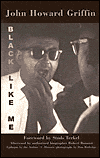| Click above, for articles in
this issue.
JOURNALISM /
INVESTIGATIVE

Black Like Me,
by John Howard Griffin
ISBN: 0930324722
"Rest at pale evening...
A tall slim tree...
Night coming tenderly
Black like me.
from Dream Variation
by Langston Hughes
In 1959, a white man did an unprecedented thing; he re-made
himself into a black man. The social experiment seemed simple enough,
change the color of the skin, and experience society through a 'black man's
eyes.' Griffin sought to live in the deep south of America for a few weeks to
see how white America treated him, and then relate his experiences in
print. The experience was revolutionary not only for Griffin but also for
those who would later discover that the 'black' man they had met was indeed
not black at all.
Griffin, the writer, is as interesting a persona as the subject
matter that he covers in this interesting book. He was educated in
France, and became a musicologist specializing in medieval music and
Gregorian chant. He received certificates of study from the Benedictines at the
Abbey of Solemnes in France. By age nineteen he was serving as a medic
for the French Resistance Army fighting the Nazis. Later he served in the U.S.
Air Corps, was wounded in the Pacific, and also decorated for bravery
under fire. His wounds and trauma resulted in a temporary state
of blindness that lasted ten years from 1946 to 1957. During that
time he began to dictate five novels. Less than two years after
regaining his sight, he altered his skin color by
using drugs, and delved into a racist society which he called
home. He would ultimately help others to see the
immorality and violence of racism in America.
"It was too much. Though I was
experiencing it, I could not believe it. Surely in America a whole segment of
decent souls could not stand by and allow such massive crimes to be committed.
I tried to see the whites' side, as I have all along... They judged me by no
other quality. My skin was dark. That was sufficient reason for them to deny
me those rights and freedoms without which life loses its significance and
becomes a matter of little more than animal survival." (p.
112)
"This may not be all of it. It may
not cover all the questions, but it is what it is like to be a Negro in a land
where we keep the Negro down. Some Whites will say this is not really
it. They will say this is the White man's experience as a Negro in the
South, not the Negro's.
But this is picayunish, and we no
longer have time for that. We no longer have time to atomize principles and
beg the question. We fill too many gutters while we argue unimportant points
and confuse the issues.
The Negro. The South. These are
details. The real story is the universal one of men who destroy the souls and
bodies of other men (and in the process destroy themselves) for reasons
neither really understands. It is the story of the persecuted, the defrauded,
the feared and detested. I could have been a Jew in Germany, a Mexican in a
number of states, or a member of any "inferior" group. Only the details would
have differed. The story would be the same.
This began as a scientific research
study of the Negro in the South, with careful compilation of data for
analysis. But I filed the data, and here publish the journal of my own
experience living as a Negro. I offer it in all its crudity and
rawness. It traces the changes that occur to heart and body and intelligence
when a so-called first-class citizen is cast on the junk heap of second-class
citizenship." Preface
The backlash to Griffin's book was stark and cruel. His
parents would be forced to sell their home and move to Mexico, as did John
Griffin and his family for nearly a year, this as a result of the harassment and
threats they were subjected to, after his voyage of discovery became
known. Griffin later moved to Ft. Worth Texas. He died in
1980. This is a book that still needs to be read. Its lessons remain as
valid, and as pressing today as they were in the late 1950's, for racism still
is with us, though be it in a subtler form.
Reviewed by
V. Saraiva
***
Posted August 17,
2005
URL: www.thecitizenfsr.org
SM
2000-2011
You are here: HOME page-OLDER ISSUES-AUGUST 2005 -Recommended Reading-Journalism
Previous : Biography
|